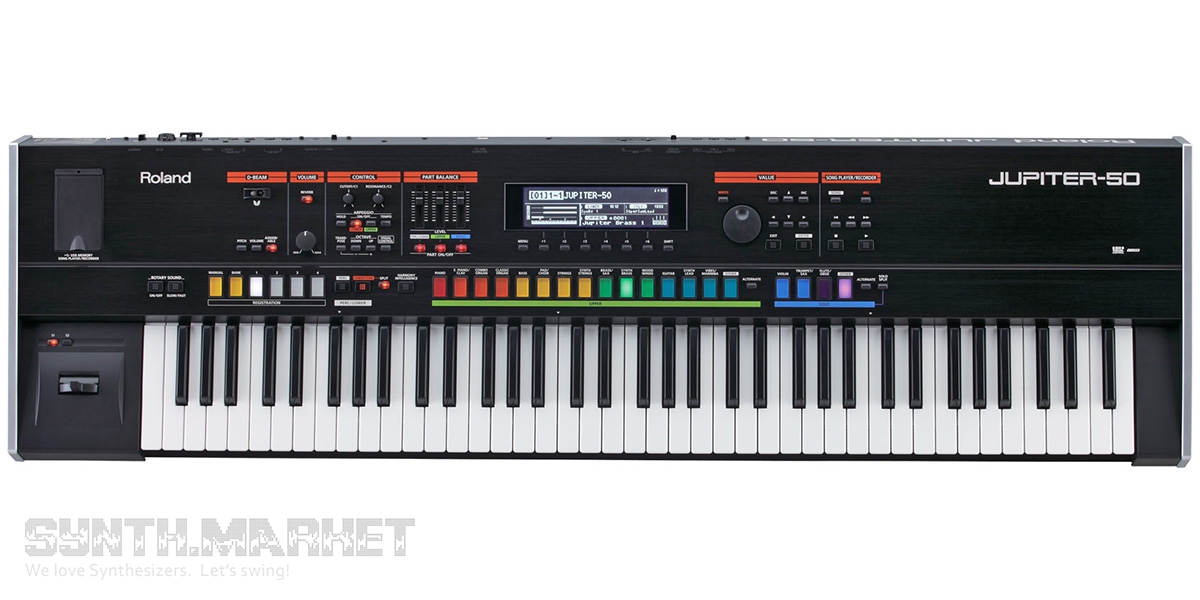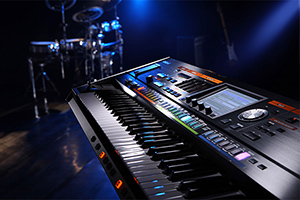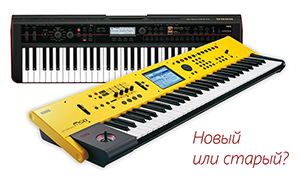The Roland Jupiter 50 is a performance synthesizer that represents a more affordable sibling to the Jupiter 80, designed to bring the unique Supernatural sound architecture to a wider audience. This 76-note instrument combines virtual analog synthesis with acoustic modeling in a lightweight, stage-ready package.
Sound Architecture
The Jupiter 50 generates sounds using two primary engines:
Supernatural Synth Engine
A sophisticated virtual analog synthesizer that builds patches (called "Tones") from up to three Partials. Each Partial functions as an independent synthesizer offering seven virtual analog waveforms with three variants each, PWM and SuperSaw depth control, plus access to 363 PCM waveforms. Every Partial includes a pitch envelope, multi-mode resonant filter, high-pass filter, dual ADSR contour generators, dual LFOs, waveshaping, unison capabilities, and analog feel modeling.
Supernatural Acoustic Engine
Contains 117 underlying Tones that utilize samples to create physical models of acoustic instruments. The Behaviour Modelling Technology converts keyboard performances into appropriate articulations for each modeled instrument. Parameters vary by instrument type - acoustic pianos offer string resonance, key-off resonance, hammer noise, stereo width, nuance, and tone character controls, while the tonewheel organ model provides nine standard footages plus leakage, percussion, and key click parameters.
Enhanced Filtering
The Jupiter 50 features four low-pass filter options within each Partial, including the new LPF2 based on the Jupiter 8's filter design, plus LPF3 and LPF4 rumored to be inspired by Prophet and Moog designs. All filters offer both 12dB/oct and 24dB/oct slope options.
Live Sets and Performance Structure
The instrument organizes sounds into Live Sets, where up to four Tones can be layered and processed. The top-level Registrations contain a Perc/Lower Part, one Live Set, and a Solo Part, supporting up to six simultaneous Tones. A significant improvement over the Jupiter 80's original design is the addition of five MFX routing options, allowing both serial and parallel effects processing configurations.
Effects and Processing
The Jupiter 50 includes four Multi-Effects (MFX) units with 76 effect types, plus a single global reverb processor. The improved effects routing allows for cascaded processing, significantly expanding sonic possibilities compared to the original Jupiter 80's parallel-only configuration.
Performance Features
The instrument includes a comprehensive arpeggiator with 128 preset styles and 16 user memory slots, plus the Harmony Intelligence auto-harmonizing feature with 17 types. The D-Beam controller allows hands-free parameter control, while V-Link protocol enables synchronized visual playback from compatible projectors.
Audio Recording and Playback
A built-in audio recorder/player supports WAV, AIFF, and MP3 file playback from USB storage, with recording capabilities in WAV format (44.1 kHz, 16-bit stereo). The system supports file looping, chaining, and pitch/speed adjustment.
Physical Design
Despite being 1.5 inches wider than the Jupiter 80, the Jupiter 50 weighs only 11kg thanks to its largely plastic construction, making it highly portable for a 76-note instrument. The monochrome 240 x 64 pixel display provides straightforward editing in both list and graphical modes, with an upcoming iPad editor for enhanced control.
Limitations
The Jupiter 50 lacks pressure sensitivity (aftertouch), which is a significant limitation for a performance synthesizer. The instrument uses an external power adapter rather than an internal power supply, and some features from the Jupiter 80 have been removed, including dedicated effects for Percussion and Solo parts, multiple reverb processors, and the color touchscreen.
Technical Specifications
Keyboard
- Keys: 76 keys with velocity sensitivity
- Type: Semi-weighted
- No aftertouch
Sound Generator
- Maximum Polyphony: 128 voices (varies according to sound generator load)
- Parts: 3 parts (Upper, Solo, Percussion/Lower)
- Registrations: 128 (including pre-loaded registrations)
- Live Sets: 2,560 (including pre-loaded live sets)
- Sound Engines:
- Supernatural Synth (Virtual Analog)
- Supernatural Acoustic (Physical Modeling)
- Partials per Tone: Up to 3
- Waveforms: 7 virtual analog waveforms (3 variants each) + 363 PCM waveforms
- Filters: 4 low-pass filter types per Partial (12dB/oct and 24dB/oct options)
Effects
- Multi-Effects (MFX): 4 units, 76 types
- Reverb: 1 unit, 5 types
- Routing Options: 5 MFX routing configurations (serial to parallel)
- *Multi-Effects can be used only with a Live Set
USB Memory Song Player/Recorder
- Track: 1 stereo track
- Playable File Formats: WAV, AIFF, MP3
- Recording File Format: WAV (44.1 kHz, 16-bit Linear, stereo)
- External Memory: USB Flash Memory (Roland-compatible required)
Performance Features
- Arpeggiator:
- Preset: 128 styles
- User: 16 styles
- Harmony Intelligence: 17 types
- Controllers:
- D-Beam Controller
- Pitch Bend/Modulation Lever
- Assignable buttons (S1, S2)
- Assignable knobs (CUTOFF/C1, RESONANCE/C2)
- PART LEVEL sliders (PERC/LOWER, UPPER, SOLO)
Display
- Type: 240 x 64 dots graphic LCD with backlight
- Editing Modes: List view and graphical view
Connectors
- Audio Outputs:
- MAIN OUT jacks (L/MONO, R) - 1/4-inch TRS phone type
- SUB OUT jacks (L, R) - 1/4-inch phone type
- PHONES jack - stereo 1/4-inch phone type
- Audio Input: AUDIO IN jack - Stereo miniature phone type
- Control: FOOT PEDAL jacks (CTRL 1, CTRL 2, HOLD)
- MIDI: IN, OUT connectors
- USB:
- USB COMPUTER port (Audio/MIDI)
- USB Memory port
- Power: DC IN jack
Power Supply
- Type: AC Adaptor (external wall wart)
- Current Draw: 800 mA
Physical Dimensions
- Width: 1268 mm (49-15/16 inches)
- Depth: 361 mm (14-1/4 inches)
- Height: 117 mm (4-10/16 inches)
- Weight: 11 kg (24 lbs. 5 oz.)
Included Accessories
- Owner's manual
- CD-ROM (USB Audio/MIDI driver)
- USB MEMORY Protector
- AC Adaptor
- Power Cord (for AC Adaptor)
Optional Accessories (sold separately)
- Keyboard Stands: KS-G8, KS-12, KS-18Z
- Pedals: DP series (pedal switch), BOSS FS-5U (footswitch), EV-5 (expression pedal)
- Audio: Stereo Headphones
- Storage: USB Flash Memory (Roland-compatible)
Software Integration
- Bundled Software: Sonar X1 LE (PC only)
- Controller Support: Roland Active Controller Technology
- Future Support: iPad editor for Supernatural Synth engine (planned)
- Protocols: V-Link for visual synchronization
















